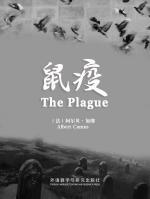My book review
陈佳雯
The Plague is written by the influential French author Albert Camus in
1942. This philosophical novel is classified as one of the famous works
of modern world literature. Recently ,the plague is attacking China
fiercely, bringing Chinese unforgettable misery. When I read this book
during the special period, I learn a lot. When the plague came to the
small town Oran, many people first thought it was ridiculous and it
couldn’t last long. So they still did what they did as usual, working
from morn till night and then proceeding to fritter away at card-tables,
in cafes and in small-talk what time is left for living. But as the
figure of death increased rapidly, people began to feel unease and
realize the urgency of taking the precautions. Doctor Rieux, government
employee Grand, priest Paneloux, and many other people like them, are
trying their best to fight against the plague in their own ways.
Frequent attacks forced on people the solidarity of a beleaguered town.
No longer were there individuals destinies, only a collective destiny.
Finally the plague was beaten away and the sun was pouring on the town a
steady flood of tranquil light. Someone lost their families, while
others reunited with their lovers. No matter joys or sorrows, everything
was restored gradually. What touches me deeply in the book is a
character named Rambert. He was a journalist from Paris. At first, what
he wanted to do was making some researches and writing articles for the
newspaper office. When he realized that the plague became more and more
serious and he was trapped in Oran, he spared no effort to escape from
the city to find his lover in Paris. After several disappointing
attempts, he found the way out of the city. But in the end he gave up
the chance and chose to stay with the sufferers, putting himself into
the dangerous rescue. Rambert said:” It may be shameful to be happy by
oneself.” If Rambert wished to take a share in other people’s
unhappiness, he’d have no time left for happiness. According to his
behavior in Oran, I dare to say that he never felt regretful, on the
contrary, he must be extremely proud of himself. This story had a happy
ending, indicating that the reality we are having now will be good one
day. There is denying that our future won’t be better without those
people who are contributing their energy and lives to the country. The
Chinese doctor Li Wenliang, first realized the plague, COVID-19, may
appear and reminded others to pay more attention. The Chinese Academy of
Engineering academician, Zhong Nanshan, called on others not to go to Wu
Han, while himself, at his age of 84, leading the team bravely to Wu Han
and struggling with all might against death. And there were numerous
doctors and nurses, coming from all over the country, rushed to Wu Han,
giving their hands to help the patients. Across thousands of miles of
land and sea, Chinese voiced their fellow-feeling and Countless
donations were raised and sent to Wu Han. People united together,
fighting for a collective destiny. The sunny day is drawing near.
Actually, life itself is like a plague. It exists objectively, never
being changed by people’s subjective thoughts. We don’t have too many
choices, either awaiting orders from fates passively, or making
preparations actively. Whether do or stay, it shows human’s dignity and
willingness. Since the order of the world is shaped by death, mightn’t
it be better for God if we refuse to believe in him and struggle with
all our might against fates, without raising our eyes towards the heaven
where he sits in silence.



 京公网安备 11010802032529号
京公网安备 11010802032529号